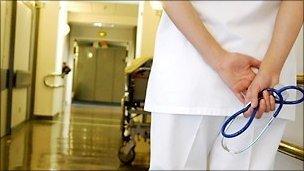NHS upheaval could have been avoided, leading GPs say
- Published

A bill is due to be published to pave the way for an overhaul of the NHS
Fears are being raised about the NHS shake-up in England with GPs branding the scale of the changes unnecessary.
Ministers will publish a health bill this week that will pave the way for GP consortiums to take over management of the NHS from primary care trusts.
Prime minister David Cameron has said "fundamental changes" are needed in the NHS.
But doctors' leaders believe that GPs could simply have taken charge of PCTs instead - and got the same results.
Their intervention is set to spark another round of debate over the government's controversial plans.
It comes on the same day as the heads of six health unions, including the BMA again, warned of their "extreme concerns" about greater commercial competition between the NHS and private companies.
In a letter to the Times, BMA chairman Hamish Meldrum, Royal College of Nursing chief executive Peter Carter and the heads of Unison, Unite and others said the speed and scale of the reforms proposed risked undermining the care of patients by putting cost before quality.
Criticism of the reform had been mounting ahead of the publication of the Health and Social Care Bill on Wednesday.
Over the weekend, the NHS Confederation, which represents managers, suggested hospitals may have to close under the planned reforms.
Among the NHS Confederation's criticisms, it said allowing GPs to commission services from what it called "any willing provider", could mean the closure of some hospitals and facilities in order to make way for new private providers.
Dr Peter Carter of the Royal College of Nursing says the reforms will cause "instability" in the NHS
When asked about the mounting concerns in an interview with the BBC, Prime Minister David Cameron said: "I've looked back on the previous government - they waited too long before introducing changes that were necessary and that would improve services."
Ministers have already started piloting GP consortiums, which will take responsibility for spending 80% of the NHS budget in England by 2013. More than 140 groups of GPs have put themselves forward for the pilots, covering over half the population of England.
Once the process is complete, the 151 primary care trusts will be scrapped.
Savings
They have said the upheaval is important as doctors are more in tune with the needs of patients, but plans have been criticised at a time when the NHS is having to make savings.
The two GP bodies told the BBC that the same results could have been achieved by a fairly simple tweak to the governance of NHS trusts.
The alternative option involves the key decision-making body for PCTs, the board.
These tend to have 13 representatives, a majority of which are members of the public. There is only a requirement for them to have one GP, although some have two or three.
Boards have to sign off all big decisions, such as setting up new services.
The two GP leaders believe by putting more doctors on the board, the government would have been able to achieve its key aim of getting doctors more involved in decision-making.
Dr Gerada, the chairman of the Royal College of GPs, said: "You could have simply mandated to ensure GPs had more of an influence on PCT boards - and achieved largely the same results. You would probably want a majority of clinicians, mostly GPs but other NHS staff too. It is not too late to change.
"By doing that GPs would have become heavily involved in making the decisions, we could have still made management savings, but without all the upheaval that the NHS is going through."
Dr Buckman agreed: "We have chaos in management in the health service and that would have been avoided. It could have been that simple."
David Stout, director of the PCT Network, said the idea could have worked.
"PCTs were improving all the time and could have adapted. It could have been another option, but it is too late now."
But a Department of Health spokeswoman said: "Primary care trusts are too remote from patients.
"Simply putting more GPs on a PCT board would not have delivered the changes that are necessary, and would have simply added more layers to the existing NHS bureaucracy."
- Published16 January 2011
- Published1 March 2013